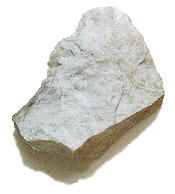Metamorphic Rocks

Marble
Metamorphic Rocks:
Metamorphic rocks started out as some other type of rock, but have been substantially changed from their original igneous, sedimentary, or earlier metamorphic form. Metamorphic rocks form when rocks are subjected to high heat, high pressure, hot, mineral-rich fluids or, more commonly, some combination of these factors. Conditions like these are found deep within the Earth or where tectonic plates meet.
Process of Metamorphism:
The process of metamorphism does not melt the rocks, but instead transforms them into denser, more compact rocks. New minerals are created either by rearrangement of mineral components or by reactions with fluids that enter the rocks. Pressure or temperature can even change previously metamorphosed rocks into new types. Metamorphic rocks are often squished, smeared out, and folded. Despite these uncomfortable conditions, metamorphic rocks do not get hot enough to melt, or they would become igneous rocks!
Common Metamorphic Rocks:
Common metamorphic rocks include schist, marble, and gneiss.
Foliated Metamorphic Rocks:
Some kinds of metamorphic rocks -- granite gneiss and biotite schist are two examples -- are strongly banded or foliated. (Foliated means the parallel arrangement of certain mineral grains that gives the rock a striped appearance.) Foliation forms when pressure squeezes the flat or elongate minerals within a rock so they become aligned. These rocks develop a platy or sheet-like structure that reflects the direction that pressure was applied.
Non-Foliated Metamorphic Rocks:
Non-foliated metamorphic rocks do not have a platy or sheet-like structure. There are several ways that non-foliated rocks can be produced. Some rocks, such as limestone are made of minerals that are not flat or elongate. No matter how much pressure you apply, the grains will not align! Another type of metamorphism, contact metamorphism, occurs when hot igneous rock intrudes into some pre-existing rock. The pre-existing rock is essentially baked by the heat, changing the mineral structure of the rock without addition of pressure.
Source: U.S. Geological Survey
| 

